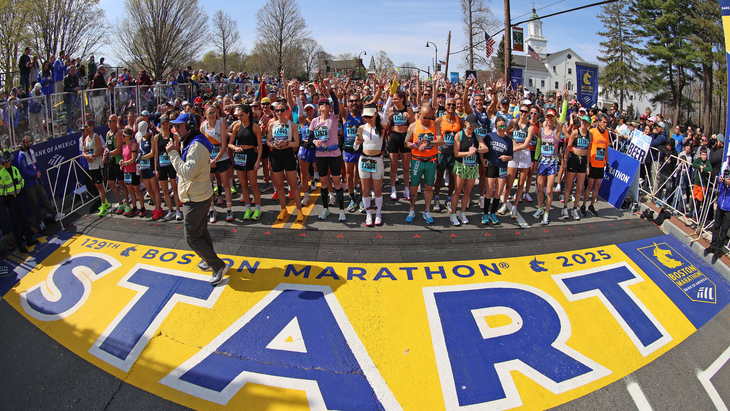Is it possible to run two marathons in a single season? Sure. Whether or not you should is another story.
After a less-than-perfect marathon, it’s tempting to try and run another race right away. (Photo: Ben Garvin)
Published October 7, 2025 08:38AM
So you ran your goal race, and it didn’t go as well as you hoped. Maybe you missed your PR by mere seconds or didn’t give yourself enough of a buffer around your Boston Qualifying time. You might be wondering: Can I run another one? Are back-to-back marathons in one season OK? Well, as a veteran running coach, I can tell you the answer is … maybe.
I know runners who run marathons nearly every weekend and others who are completely wrecked physically and mentally by that distance and only dare to run one marathon every year or two (or three). But if you have the desire to go for a second 26.2 in one season, let’s break down why that may or may not be a good idea for you.

Why Even Try Another Marathon?
The big challenge for the marathon is that you have “all your eggs in one basket.” If you hit marathon day feeling great and have perfect weather, then it all works out.
But at times, marathon day does not go as planned. The weather may not cooperate. You may have an off day. You experience a wardrobe malfunction. Whatever the reason, your marathon gets derailed.
It’s tempting to turn around and run another marathon. After all, you want to capitalize on your great fitness, and you really, really want another crack at it.
My Rules for Multiple Marathons
I should note that when we talk about running a second marathon, that is normally three to eight weeks after the first marathon. The more time between the races, the more recovery time you have, so some of the extended soreness, aches, and pains can be worked through. But the point is that you need to feel like a fit runner again for at least two to three weeks before the second marathon to have another peak performance.
When one of my runners is looking to run back-to-back races, I look at two big factors.
#1.Your Beat-Up Body
First and foremost, how beat up are you from the first marathon?
Some muscle soreness for the first two to five days after the marathon is normal. As you ease back into a few short runs, however, that soreness should gradually go away, and by the end of the second week post-marathon, you should find that your runs feel easy again and your paces are close to what you ran pre-marathon.
That’s a positive sign that you can do a quick turnaround and run another marathon in three to eight weeks.
If, however, your soreness, aches, and pains continue and you find yourself struggling to run easily, that’s a bad sign. And even worse, if you’re limping along, favoring a particularly painful area, then it’s a big risk to try to get ready for another marathon.
#2. Mental Fatigue
Secondly, what about your motivation levels? This is a tricky one for me as a coach.
Like a dog with a bone, runners who don’t achieve their goal just won’t let it go, and this can cloud their judgment.
Intellectually, these runners want another go at the marathon. They want to get that BQ or see all of their hard work in training pay off with a good race result.
On the other hand, marathon training and marathon racing are very challenging mentally. You need to really be honest with yourself.
Do you really want to go through it again? Do you really have it in your heart to race the marathon again so soon? To suffer again? To risk again? Or for some runners, the question becomes, “Am I just doing a second marathon to satisfy my type-A brain?”
The mental aspect is not trivial. I witness mental fatigue a lot with runners chasing the BQ. They get worn down mentally from marathon to marathon as the seemingly never-ending chase for the BQ drags on.
So really think long and hard about it. Are you itching to run another one? Are you beyond excited to get another try? If the answer is yes, then let’s get to training. If not, it’s best to sit the marathon out and focus on the next training cycle.

Training for Back-to-Back Marathons
Let’s say you aren’t too beat up or mentally fatigued from the first one. The next question becomes how to train in between the marathons.
As I mentioned earlier, the time between the “back-to-back” marathons is typically three to eight weeks. As you would expect, the more time you have to properly recover from the first marathon and then ease back into full training for the second one, the less risky doing back-to-back marathons becomes.
As a result, it is critical that you ramp up your recovery after the first marathon. Frequent ice baths, self or professional massage, gentle walking, and very slow jogging are critical for the first two weeks after the first marathon. In addition, you must ramp up your nutrition (with particular emphasis on protein intake) and hydration. Lastly, rest, rest, and rest some more.
If your second marathon is within three to four weeks of the first one, then you can essentially repeat the tapering phase from your first marathon training plan. Take one to two weeks of marathon recovery, then ease into the same routine you used before the first marathon.
If, however, you have five or more weeks between races, then here is what I recommend:
Run Less
First, repeat your previous marathon plan BUT run less. Reduce the total volume (aka mileage) by 15-25%. Just shorten each run that you do, and even consider an extra day off per week.
And never jump back into a long run. Ease into them. If your plan calls for 18 miles but you’re just coming off your two weeks of recovery running from the first marathon, shorten the long run to 60-90 minutes.
You don’t need a lot of long runs to be race-ready. You already did that for the first marathon. You simply need to feel good again as you run.
Any running from one to two hours in the time between the races is plenty for most runners to be marathon-ready again. Yes, it’s OK to run more if you’re feeling good, but I suggest you keep your long runs between these races to two hours or less.
Run Easy
Second, don’t chase new fitness. You simply need to recapture the current fitness you have. If you push for more fitness, you risk injury and fatigue.
Instead, try to see how easily you can run your paces and don’t try to exceed your previous paces. And consider running a lower volume of the fast running.
If your previous marathon plan prescribed a Fartlek run of 15 X 1 minute at 10K effort with 1 minute recovery, shoot for 8-10 repetitions in your “between marathons” training. Again, you don’t need new fitness—you just need to feel like a runner again.
I also suggest you skip the workouts that are uber stressful to the musculoskeletal system. That means hill workouts and speed workouts. Instead, replace those workouts with marathon goal pace workouts. This will be easier on your body and help you dial in race pace.
Lastly, err on the side of more recovery and less training stress always. This is not the time to chase mileage. Accept 15-25% less mileage as optimal because it is. Take extra days off and listen to your body closely. If you get any signs of accumulating fatigue, back off.
TLDR: It Is Possible
I just ran the Sydney Marathon and the Berlin Marathon, which were 20 days apart. I wasn’t racing them all out, so it was very doable, but I can tell you that you need to be careful. You need to respect your body and your mind.
If you do, then you can run back-to-back races and may, like some runners, even run faster in the second marathon.














